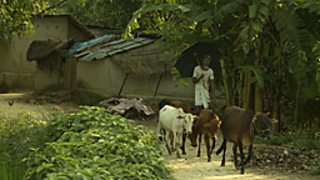"Loss and damage from climate change": a view from Bangladesh
Arif Al Mamun
Senior Research Officer
Tagged with:
At last week's climate change talks in Doha, it took 36 hours of negotiation between 195 nations to arrive at a plan where rich nations will compensate poor countries for "" inflicted by climate change.
As part of my work conducting research in Bangladesh for , I've seen the reality of such "loss and damage" – and what it means for people’s lives.
I've spoken to a farmer in the south of the country whose land is barren because of increased salinity – the amount of salt in the soil.
His only options to earn money are now to become either a day labourer or rickshaw puller – both of which he feels is a step down the social ladder. He feels like he's failed.

In the village of Mithekhali in another part of southern Bangladesh, I've seen a cow in its dying moments, starving because the salinity of the soil means grass cannot grow. People told me that without their cows, they can't plough their land.
In northern Bangladesh, I spoke to another man who had already been forced to give up his trade – this time as a fishermen - and become a labourer. Several years of drought had seen the rivers he fished dry up and the fish stocks plummet.
What's clear from our research across seven countries in Asia is that people don’t know what climate change is, what it means, or how it happens, but they feel it in their day-to-day lives.
In Bangladesh, we have just finished a nationally representative survey of 3600 people. This has shown that people perceive decreases in agricultural productivity (40%) and are feeling that changes in climate are having an impact on their livelihoods (74%).
Our challenge is now to give some traction to these findings. As part of the Climate Asia project, we're building an online data portal which will help people who are communicating about such topics to audiences like the farmers and fishermen. Using this portal, they will be able to find and generate information about their audiences that is useful in targeting and creating effective communications.
Our plan is to launch the full findings, reports and data portal in September 2013.
Related Links
From the 主播大秀 Media Action blog:
